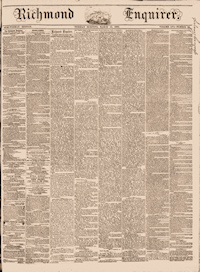February 19, 1861; Richmond Enquirer
The Peace Congress, a body composed of most respectable gentlemen from, we believe, twenty one States, is now assembled in Washington, and they are looked to by the people of the United States for propositions of amendment, which shall restore peace to the country, and bring back the seceded States. While the object of the Congress is most laudable and praiseworthy, the prospect of success is by no means bright and cheering. Not the first intimation, that we have seen, has been given from any source, worthy or unworthy of consideration, within any one of the seceded States, that these States will, under any compromise, concession or amendment, hasten to return to a Union with the Free States. The formation of a Provisional Government, the election and inauguration of executive officers, the preparation for a permanent Government, all plainly forbid any expectation of any facile abandonment of their present position to again reunite themselves with all the States of the Federal Union. Hopeful, indeed, and credulous beyond wisdom, must be the men who look for a reunion of the Gulf States with the Free States under the terms of any patchwork compromise. The character of Jefferson Davis and A.H. Stephens forbids the supposition of the child’s play that is implied in the expectation that they will abandon permanent peace in a confederacy homogeneous in institutions and interests, to again seek security in a Union, the dominant section of which has just driven their States beyond its pale, and whose present and prospective authorities are threatening and preparing for forcible conquest and subjugation.
The prompt manner and unparalleled unanimity with which the people of the Seceded States have braved war, incurred the loss of commerce, the prostration of business, all combine to demonstrate that no idle threat, no mere bluster, is intended, but that a permanent and final separation has been determined upon by the people of those States.
In vain will intimations of a back down be looked for in any State from South Carolina to Texas. Everywhere throughout these States the settled purpose of final separation, with war and invasion, if forced upon them manifests itself to the most careless and inattentive observer. The Seceded States are not the parties which instituted the Peace Congress, they are not represented, they have declined to take part in its deliberations, and no evidence has been furnished that they care one iota as to what may be the character of its propositions. What rational hope is there that these States will respect the labors or regard the conclusions of the Peace Congress? None whatever.
How stands the case of the Northern States? Is the respect of final adoption of the recommendations of the Peace Congress encouraging to men of common sense and observation? Does the fact of appointing Commissioners imply concession, or evidence a purpose to yield the just rights, and concede the perfect equality of the slave States? The people of Virginia have evidently construes these appointments of Commissioners as indicative of reviving justice at the North, and though we have no faith in any such prospect of future security, yet, acknowledging the right of the people to trifle even with their dearest rights, we are bound to await the issue. Since it is impossible to remedy the evils which this delay involves, let the Convention calmly review the prospect of future justice from the North and shape their action accordingly.
The President elect has started from his home and is now journeying to Washington by a route as zig-zag and crooked as a Virginia worm-fence, but in all his twisting and turning he has deliberately avoided soiling his feet with the dust of a slaveholding State. Upon this route the President elect has told the people of Indiana what he understands. His explanations are before the Convention of Virginia and it is for it to say whether or not they are satisfactory.
